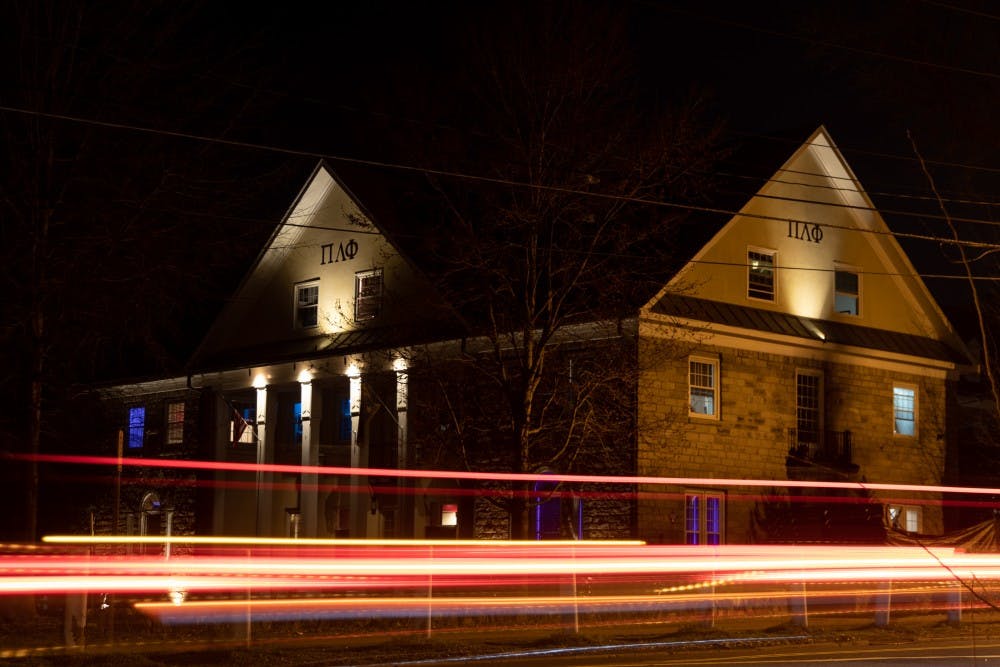This places limitations on what the fire department can reveal about the case, such as how the fire department knew for sure which brothers occupied the bedrooms with violations and were deserving of charges or what caused the leak.
Pi Lambda Phi, Incorporated, the national chapter of the fraternity, is also looking into the case. Director of Operations Patrick Spanner made a statement on behalf of the organization.
“The health and safety of our members and guests is of the upmost (sic) importance to Pi Lambda Phi Fraternity,” he said. “The International Headquarters, in partnership with the chapter's Housing Corporation and advisers, is investigating and will address any policy violations.”
Northam said that in this instance, someone from the house called 911 to have firefighters investigate the alarm. Normally, a carbon monoxide alarm would be an automatic trigger for the fire department to report to the scene. This is because fraternity houses are classified as commercial buildings and are held to different fire codes than residential buildings, Sullivan said.
Why fraternity houses are commercial dwellings
Since fraternity houses are classified as commercial buildings, they are held to the same fire and safety codes as businesses.
According to the fire safety page of The Office of Fraternity and Sorority Life, fraternity and sorority houses are under the jurisdiction of the Chapel Hill Fire Department. This is because the houses are in the Town of Chapel Hill and pay over $350,000 in property taxes.
Sullivan explained that there are two types of dwellings: residential and commercial. The classification depends on the number of people living in the building.
According to Sullivan, the fire code says that if there are more than five unrelated people residing in a building, it goes from being a residential dwelling to a commercial dwelling.
This is because the hazards are amplified when ten to twenty unrelated people are living, studying and eating together in a building, Sullivan said. The higher occupancy means there would be more people to rescue in the event of an emergency.
This classification is not unique to fraternity and sorority houses. Sullivan pointed to apartment complexes and hotels like the Red Roof Inn as places that also use commercial fire codes because of the non-related occupancy levels.
A statement by UNC Media Relations elaborated on the safety standards that fraternities and sororities are held to.
To get the day's news and headlines in your inbox each morning, sign up for our email newsletters.
"The University takes the issue of fire prevention and safety very seriously," the statement said. "Every semester, each fraternity and sorority that operates a house is required to participate in fire safety training co-hosted by UNC-Chapel Hill's Office of Fraternity and Sorority Life and the Chapel Hill Fire Department. Following the training, each house conducts a fire safety self-inspection to prepare for their official inspection by the Chapel Hill Fire Department."
One undergraduate from each chapter is elected as Fire Marshal and carries out these measures with the Chapel Hill Fire Department.
Chief Sullivan emphasized the importance of fire safety around students, no matter where they live, especially due to the community’s history of a tragic fraternity house fire.
Deadly fraternity blaze 1996
On both graduation and Mother’s Day in 1996, a cigarette thrown in the trash at Phi Gamma Delta ignited a fire that killed five UNC students.
Since then, the community has worked to increase fire safety in fraternity and sorority houses, Sullivan said. The Fire Safety program was created by the Office of Fraternity and Sorority Life and Off Campus Student Life in 1996 in direct response to the fire.
The director of Greek Affairs and the fire chief at the time of the fire worked together to craft legislation for the town council that would require the houses to have sprinkler systems installed.
Today, sprinklers are part of the fire protection systems that can be found in fraternity houses.
“We have a history in this community of having a really tragic fraternity house fire that occurred back in 1996," Sullivan said. "I think it’s important to recognize that back then fraternity and sorority houses for the most part didn’t have the advanced protection systems and sprinklers like they have today, and it took five students dying to change legislation to bring some of these houses into the current compliance.”
Since then, there has not been any violation of code comparable to the February Pi Lambda infraction, Sullivan said.
“In my recent recollection, this is the first time we’ve found an egregious violation as they found the other day,” Sullivan said.
@elizltmoore
university@dailytarheel.com



